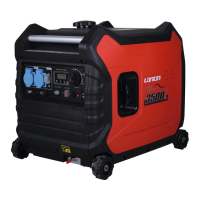Safety Precautions
b
Please carefully read the Manual before operating
the generator unit. Safe operation and optimum
performance will only be achieved when the the
equipment is operated and maintained correctly.
Following marks will be found throughout the Manual
to remind you that there may be danger for the
operator, maintenance personnel and equipment.
Remind you that there may be
imperative danger that may cause severe personal
injury or death.
Remind you that there may be
dangerous situation that may cause severe personal
injury or death or unsafe operation.
Remind you that there may be
dangerous situation that may cause personal injury,
equipment damage or property loss or unsafe
operation.
Electricity, fuel oil, exhaust emissions, moving parts
and batteries may cause dangers, and safety
precautions for them must be followed to prevent
severe personal injury or death.
Exhaust Emissions may Cause Death.
The electric generator can only be operated
outdoors and the operator shall keep away from it.
Exhaust port.
Ensure that exhaust emissions from the generator
unit will not enter windows, doors, air vents or air
inlets of adjacent buildings, vehicles or vessels.
The generator unit is not allowed to be used in
residences, garages, basements, granary, wigwam,
cabins, vessels, vessel houses, entertainment
vehicles or tents, closed outdoor spaces (e.g.
alleys, irrigation canals and ditches, parking
garages or courtyards) or any other spaces where
exhaust emissions may accumulate. It shall be
noted that even though the unit is placed indoors
with all windows and doors opened and the air
blower turned on, the concentration of carbon
monoxide, which is harmful, in exhaust emissions
from the engine will also accumulate.
The Gasoline is Inflammable/Explosive.
The fuel oil can only be filled outdoors.
Electrostatic sparks caused by the fuel oil flowing
through the nozzles of oil pumps of gasoline
stations may ignite the gasoline. Nozzles of oil
pumps of gasoline stations are not allowed for
filling fuel oil to the generator unit. Instead, the
fuel oil shall be filled to a explosion-proof fuel
tank placed on the ground first, and then to the
generator unit slowly.
The fuel oil shall not be filled to the generator
during operation. The engine of high temperature
may ignite the fuel oil.
To prevent fire resulted from fuel oil leakage, fuel
valves must be closed and the generator unit must
be cooled down before transporting the generator
unit or preserving it in a closed space.
Smoking and open fire are strictly prohibited
adjacent to the generator unit. Flame, sparks,
electric switches, pilot torches, electric arcs,
equipment generating electric arc as well as any
other ignition sources must be kept away from the
generator unit.
The Voltage of Generator Unit may Cause
Death.
It is not allowed to connect the generator unit to
the electric system of buildings directly. The
feedback current may cause death of electric
power circuit workers due to electric shock and
equipment damages. An approved switchgear
must be used to prevent the connection with
generator unit. Under circumstances of using the
generator unit as power supply for emergencies,
trained and experienced electricians must be
selected to conduct electrical connection.
Make sure your clothes, shoes and skin are dry
when operating electrical equipment.
It is strictly prohibited to operate the generator
unit in rains or snows or on wet ground.
Moving Parts may Cause Severe Personal
Injury or Death.
The spark plug wire shall be disconnected before
any maintenance for the generator unit.
Both of your hands must keep away from moving
parts.

